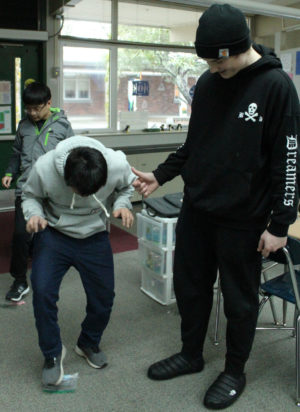Peer coaching is a semester-long class where students give individual academic support to other students with moderate to significant disabilities. The class gives peer coaches a few assignments throughout the year that raise awareness for disabilities, but most coaches remember it for the new friendships, welcoming teachers and flexible environment that the class provides.
Senior Owen Jones (he/him) has been a peer coach since elementary school and said it’s his favorite class. He said the class has impacted him by really showing him what peoples’ lives are like.
“I’ll see people take Snapchats or take pictures of special needs kids — even in the bathroom — which is kind of crazy to me. I’ve definitely seen people treat them differently or poorly because of their special needs,” said Jones.
Photographing a person without their knowledge or consent in a place where they could have a reasonable expectation of privacy is against Washington state laws.
Jones said he doesn’t see an end to the bullying of disabled students, but his goal is to help as many people with disabilities as he can.
“I almost felt like I was blinded to an entire different world because these people are living their life just like me, but just because they look a little different or speak a little different, or don’t learn as easily; seeing them get treated in a negative way really impacted me,” said Jones. “I have a bunch of best friends, who I’d say are some of the best people I’ve ever met, through [peer coaching].”
Jones’ connection to the students isn’t uncommon among peer coaches.
“Usually the ones that sign up for it sometimes sign up because they think it’s going to be an easy grade, which it is, and then they fall in love with the students. Other times, I think they already have a passion for it,” said functional skills and academics teacher Denise Holsapple (she/her). “It’s one of their favorite classes, and the students that come usually really enjoy it, so they keep coming back.”
However, according to Holsapple, the number of both peer coaches and FSA students has dropped dramatically this year, and she doesn’t know why.
“The number of [FSA] students I have this year went from 12 to four. Normally, in a regular year where I have 12 students, there are usually three to four peer coaches a period. This year, I have several periods where I have zero, so I’m begging the counselors to send peer coaches,” said Holsapple.

Senior peer coach Savannah Nelson (she/her) said she thinks the class isn’t talked about enough and that counselors treat it as a filler. She described the class as an eye-opening experience in how people learn and would recommend it to anyone who wants to have an impact on kids. Nelson said she values the importance of treating the students as equals.
Sophomore Khaliya Poptiya (she/her) — one of two verbal students in the FSA class — reflected on the impact of her peer coach from last year, sophomore Gabrielle Incarnato (she/her).
“She’s a really good peer coach. She sits with me, and sometimes if I need help with math, she just comes over to me. I just raise my hand and say, ‘Can you please help me?’ and she helps me,” said Poptiya.
Incarnato said the class has helped her build friendships and made her better at talking and working with both students and teachers. Peer coaches spend time learning American Sign Language to more effectively communicate with nonverbal students.
“I think it’s definitely helped me be more patient and more understanding,” said Incarnato. “There could be a ton of emotions in the room, especially with our nonverbal students.”
Jones agrees that patience is a key part of getting to know the students. Through the class, he said he’s realized that he has more similarities with students in FSA than he previously thought.
“You want to make sure that they know that you’re there as a friend, too,” said Jones. “I’ve hung out with a few kids in that class outside of school. I show up to the events that they’re going to. I participate in activities they do, like Unified Bowling and Unified Club.”
The sense of friendship is mutual; peer coaches have the ability to bring both social and academic change. Holsapple mentioned that FSA students feel more comfortable carrying conversations with peer coaches.
“Caleb will do things for Owen that he won’t do for anybody else,” said Holsapple. “As soon as Owen walks in the door, his face lights up and he goes running towards him — you know, his buddy is here. So the impact that [peer coaches] have on our students is huge.”












